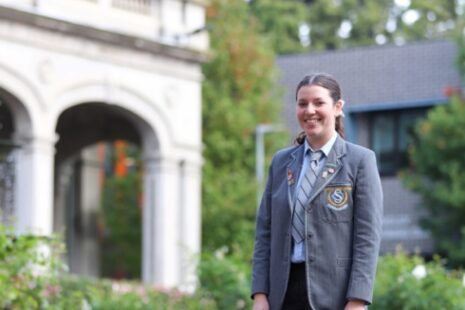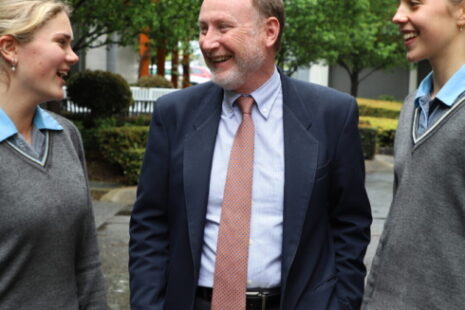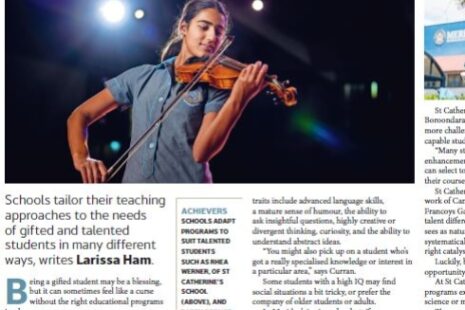Developing the young inquiring mind

Young children have naturally curious minds and a yearning to ask lots of questions. They want to know how things work and why things happen. This is one of the ways in which they make sense of their world.
“All the world is a laboratory to the inquiring mind.” Martin H Fischer
Questions are a powerful tool for educators to promote children’s thinking and learning. They exercise their sense of agency and develop complex problem-solving skills by asking questions and having opportunities to explore their curiosities.
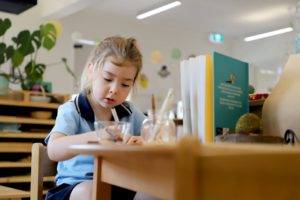 Within our Early Learning Centre (ELC), we take an inquiry-based approach to our curriculum. This captures the children’s spirit of curiosity creating an engaging curriculum that places the children’s questions at the centre of their learning.
Within our Early Learning Centre (ELC), we take an inquiry-based approach to our curriculum. This captures the children’s spirit of curiosity creating an engaging curriculum that places the children’s questions at the centre of their learning.
Whilst inquiry tends to develop spontaneously as children engage with their questions and ideas, educators plan learning experiences with specific outcomes in mind. The curriculum is therefore responsive and flexible, and can adapt to the children’s ideas and questions. Their learning becomes more rich, meaningful and contextual.
Young children learn best through active, hands-on discovery where they can think, hypothesise, predict, problem solve and discover their own answers. When educators support children to investigate their own ideas, they foster independence and autonomy and promote inquiry and exploration as valuable approaches to learning.
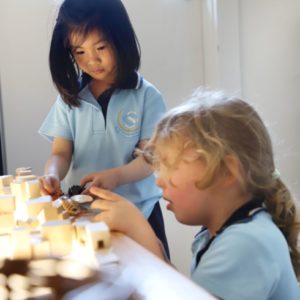 Our ELC philosophy acknowledges our belief that children are capable learners, and active constructors of their own knowledge and understandings. This view of learning reinforces the need for experiences that offer children opportunities to pursue their interests and shape their own learning. The child’s sense of agency is promoted by providing them with opportunities to make choices and decisions, and have a voice in conversations. This motivates and empowers them as they feel valued, respected and in charge of their own learning.
Our ELC philosophy acknowledges our belief that children are capable learners, and active constructors of their own knowledge and understandings. This view of learning reinforces the need for experiences that offer children opportunities to pursue their interests and shape their own learning. The child’s sense of agency is promoted by providing them with opportunities to make choices and decisions, and have a voice in conversations. This motivates and empowers them as they feel valued, respected and in charge of their own learning.
“Inquiry-based learning provides an opportunity for early learners to develop student voice and agency, as their ideas and interests spark and extend learning possibilities.” Early Years Learning Framework (EYLF)
The inquiry-based approach is characterised by a depth of learning. Educators scaffold deeper thinking by asking open-ended questions and provoking the children’s curiosity. Questions such as “What do you think…” or “How else could you do this…” challenge the child’s thinking and prompt them to dig deeper with their thoughts. Children typically become absorbed, fascinated and motivated as they explore their interests, and over time, make connections and develop significant understandings. The children’s learning is supported by the educators who use intentional teaching to scaffold and extend the children’s thinking and ideas. There is less transmission of knowledge and more support and extension of the children’s own attempts at understanding.
Inquiry is a collaborative process for the children. Their learning is enriched when they work with others to solve a problem or investigate an area of interest. Exposure to other children’s ideas and perspectives helps to broaden individual understandings. The inquiry process provides a context for educators to engage in sustained conversations with children. Through such conversations, educators are able to enrich and guide the children’s thinking and learning, enabling the children to gain new understandings of themselves, the learning process and a particular area of interest or inquiry.
It is our aim to nurture and further develop the inquiring minds of our young learners. By doing this we are fostering life-long skills that will support their learning journey through school and beyond.


